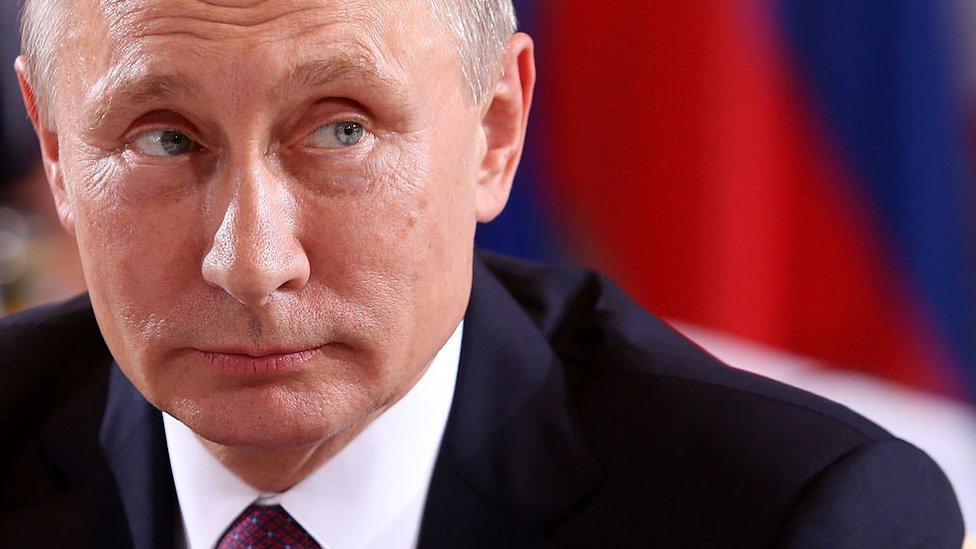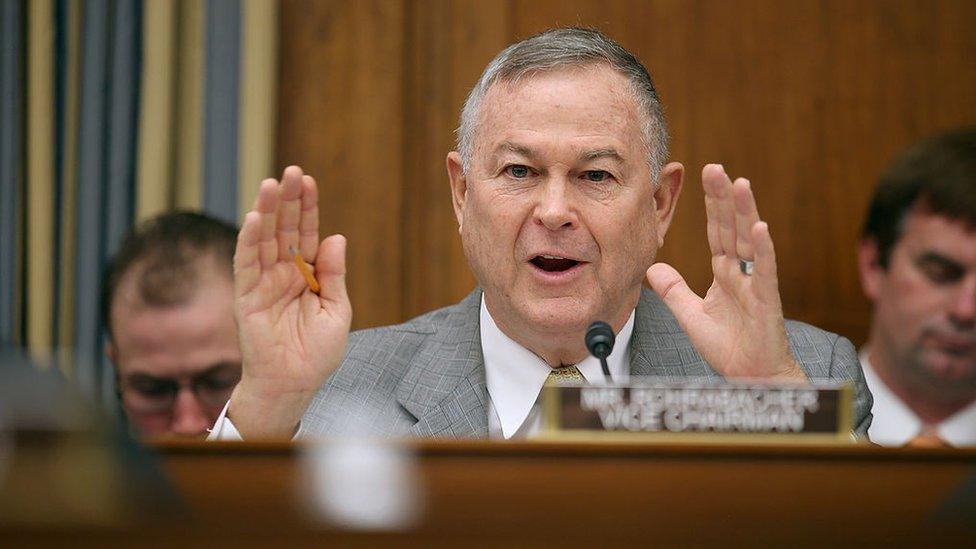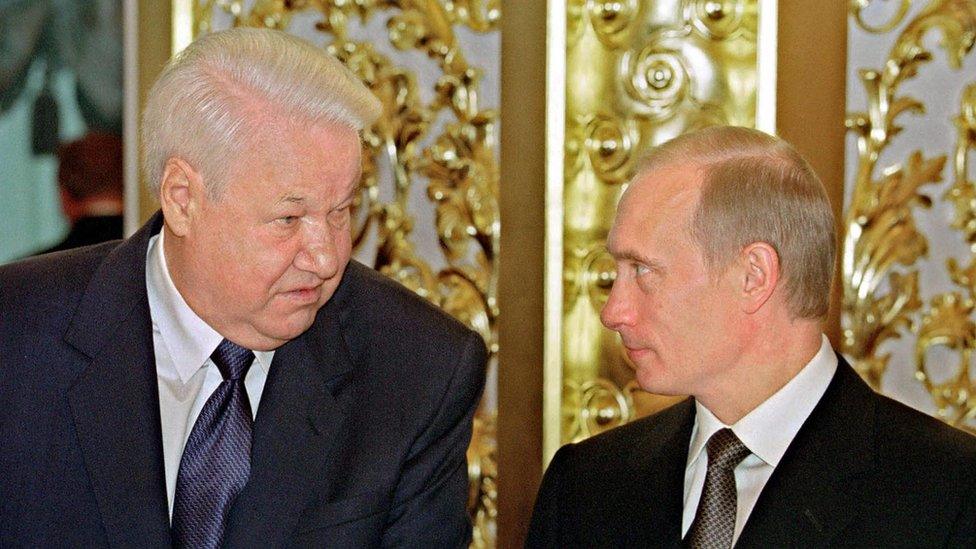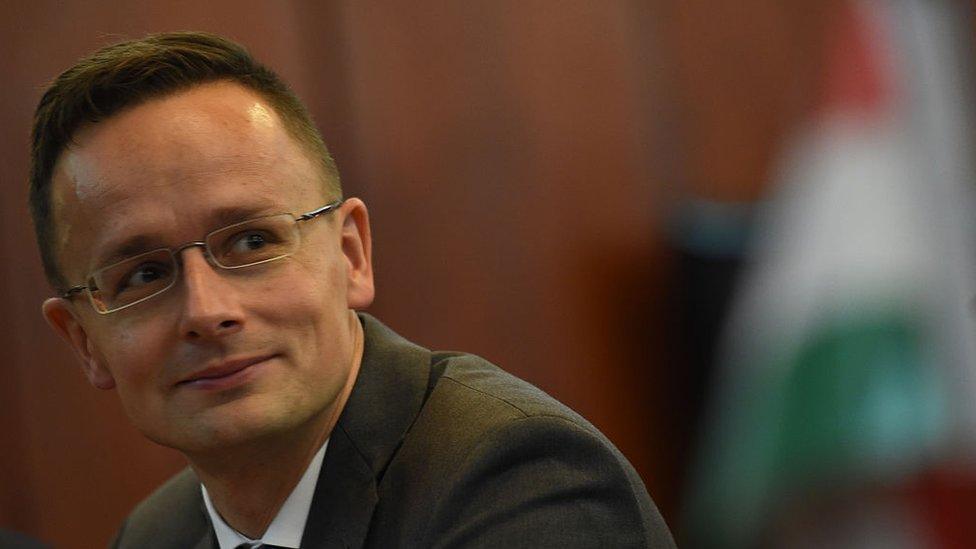The pull of Putin
- Published

Donald Trump's willingness to build better relations with Russia is threatening to turn US foreign policy on its head. His openness towards Vladimir Putin has dismayed most of the foreign policy establishment in Washington. But it's now shared by some European politicians, not all of them far-right extremists, in France, Italy, Hungary, the Czech Republic and elsewhere. They can't all be Kremlin agents - so what's the new pull of Putin for some in the West?
The two politicians, one American, one Russian, put down their drinks and clasped hands across the pub table. Then they both pushed. But there was no real contest.
The arm-wrestling match was over in a second and the winner was the deputy mayor of St Petersburg, a man who'd built up his strength through years of judo training. Few outside Russia had ever heard of him. But five years later he would become its president.
US Congressman Dana Rohrabacher still laughs when he recalls his brief duel with Vladimir Putin in 1995, when the Russian came over in an official delegation. He hasn't met Mr Putin since. But for many years he's been the most consistent voice for détente on Capitol Hill, often effectively in a minority of one.
"I don't see Putin as a good guy, I see him as a bad guy. But every bad guy in the world isn't our enemy that we have to find ways of thwarting and beating up," Congressman Rohrabacher says.
"There are a lot of areas where this would be a better world if we were working together, rather than this constant barrage of hostility aimed at anything the Russians are trying to do."
Mr Rohrabacher doesn't condone Russian hacking during the US election campaign or the Kremlin's military incursions into Ukraine. But he believes Russia is the victim of Western double standards.

US Congressman Dana Rohrabacher believes the West should co-operate more with Russia
And that view is shared by some Western experts on Russia, though the vast majority stress how aggressive the country has become under President Putin.
Richard Sakwa, Professor of Russian and European politics at the University of Kent, in the UK, is in the minority camp. "We are living in a huge echo chamber which only listens to itself," he says. "The key meme is 'Russian aggression' and it's repeated ad nauseam instead of thinking.
"When we have national interests, that's good. But when Russia tries to defend its interests, it's illegitimate, it's aggressive, and it's dangerous for the rest of the world."
Russia's 2014 takeover of Crimea and military support of separatists in eastern Ukraine is widely taken as evidence that Mr Putin seeks to extend his country's borders.
But Prof Sakwa sees the Ukrainian crisis as a symptom of the failure after the Cold War to establish a new international security system that would have included Russia.
Meanwhile Stephen Cohen, Professor Emeritus of Russian Studies at New York University, argues that the "vilification" of President Putin in the West stems originally from disappointment that the Russian leader turned his back on some of the Western-inspired reforms of his predecessor, Boris Yeltsin: reforms that many Russians blame for the lawlessness and falling living standards of that period.
"Putin is a European man trying to rule a country that is only partially European," Cohen says. "But we demand that the whole world be on our historical clock."

Did President Putin turn his back on Boris Yeltsin's reforms?
Prof Cohen is a rare liberal voice for detente. Most Americans who want better relations with Russia are on the political right.
Some are neo-isolationists who dislike what they see as their country's attempts to "export democracy", whether to Iraq, Syria or Russia. In that, they're at one with the Kremlin, which opposes any outside interference in the affairs of sovereign states.
Others are "strategic realists" who argue that great powers, including Russia, will always have "spheres of influence" beyond their borders.
America's Monroe Doctrine sought to prevent outside military and political involvement in the New World.
The opposite argument is that independent states have the right to belong to whatever alliances they like. Most former Soviet-bloc countries in Eastern Europe joined NATO and the EU after the Cold War.
And some present and former leaders of those states have warned Trump that any attempt to strike a grand bargain with Mr Putin would endanger the region's security.
But one central European government - Hungary's - takes a different view. "We don't see Russia as a threat to Hungary," its foreign minister Peter Szijjarto says. "If Russia and the US cannot work together on global issues, then that undermines security in Eastern Europe."

Hungary's Foreign Minister Peter Szijjarto says his country doesn't regard Russia as a threat
Hungary also wants to end the Western sanctions imposed on Russia following its annexation of Crimea. It says they've been counter-productive, leading to Russian counter-sanctions which have damaged European export industries.
Peter Toth, head of the Hungarian association of breeders of mangalica pigs - whose fat is much prized in Russia - says his members are among those now suffering.
But the Hungarian government, which has been widely criticised for curtailing some democratic checks and balance, also shares other interests with Russia. Prime Minister Viktor Orban has said Europe must keep its "Christian values" in the face of immigration from Muslim countries.
The Kremlin has also made much of the need to preserve national identity and Christian values in its rhetoric, leading nationalists in the West to see Moscow as an ally.
Many, particularly on the right, believe the threat from mass immigration, and terrorism, is now greater than that from Russia.
Congressman Rohrabacher says: "To say Russia is the enemy, when they too are threatened by radical Islamic terrorism, is exactly the wrong way to go."
Arguments like that, reinforced by President Trump, seem to be swaying some Americans. By the end of last year, more than a third of Republican voters viewed President Putin favourably, according to a YouGov poll, compared to only a tenth in 2014.
It found however that Democrats dislike Mr Putin more than ever. Prof Stephen Cohen believes Donald Trump will have great difficulty selling a new policy on Russia.
"If Trump says we need a detente with Putin for the sake of our national security," he explains, "it's going to be very hard to get people in the centre and the left to support it, because they'll be called apologists for Putin and Trump. It's a double whammy."
Tim Whewell's BBC Radio 4 programme, The Pull of Putin, is available to listen to via BBC iPlayer.